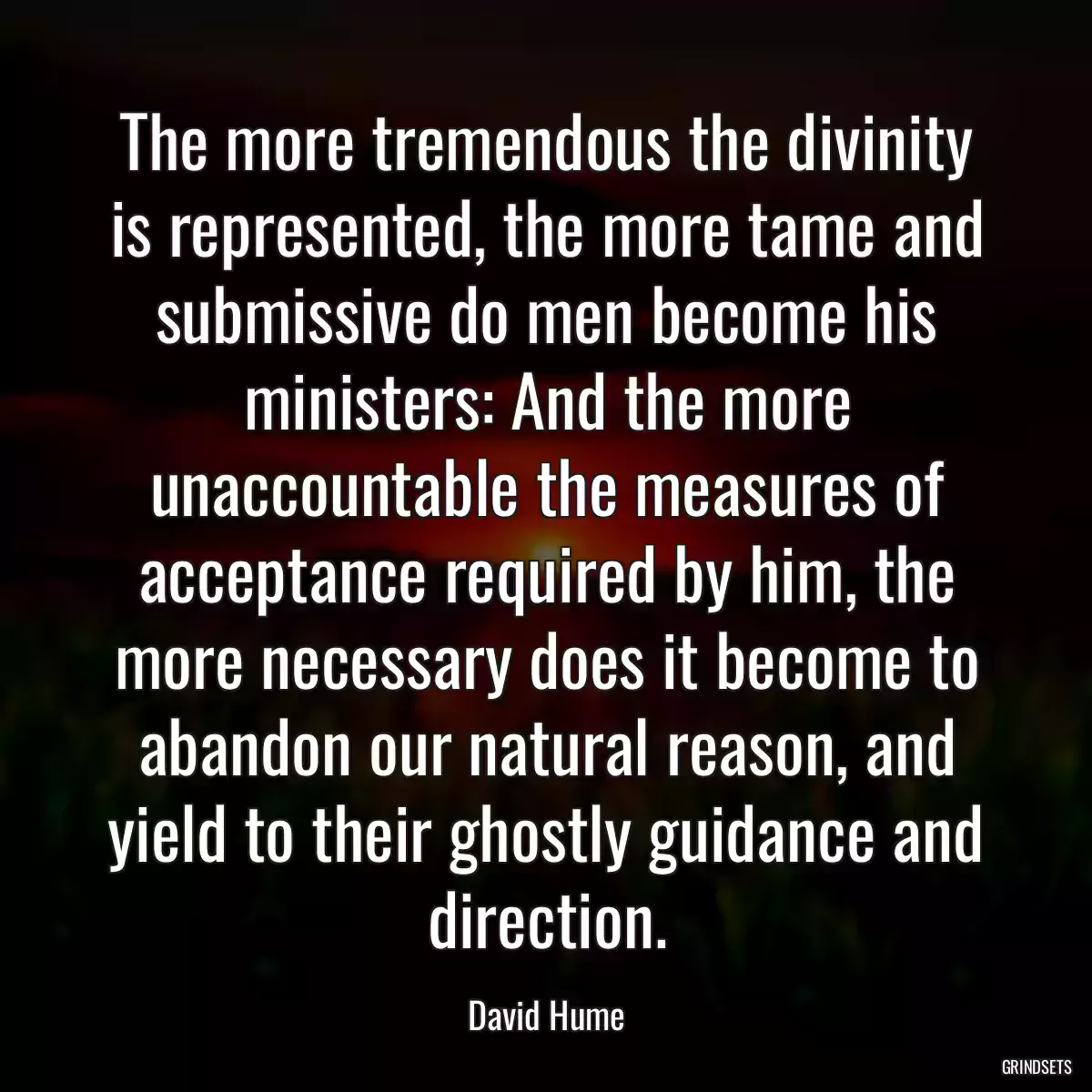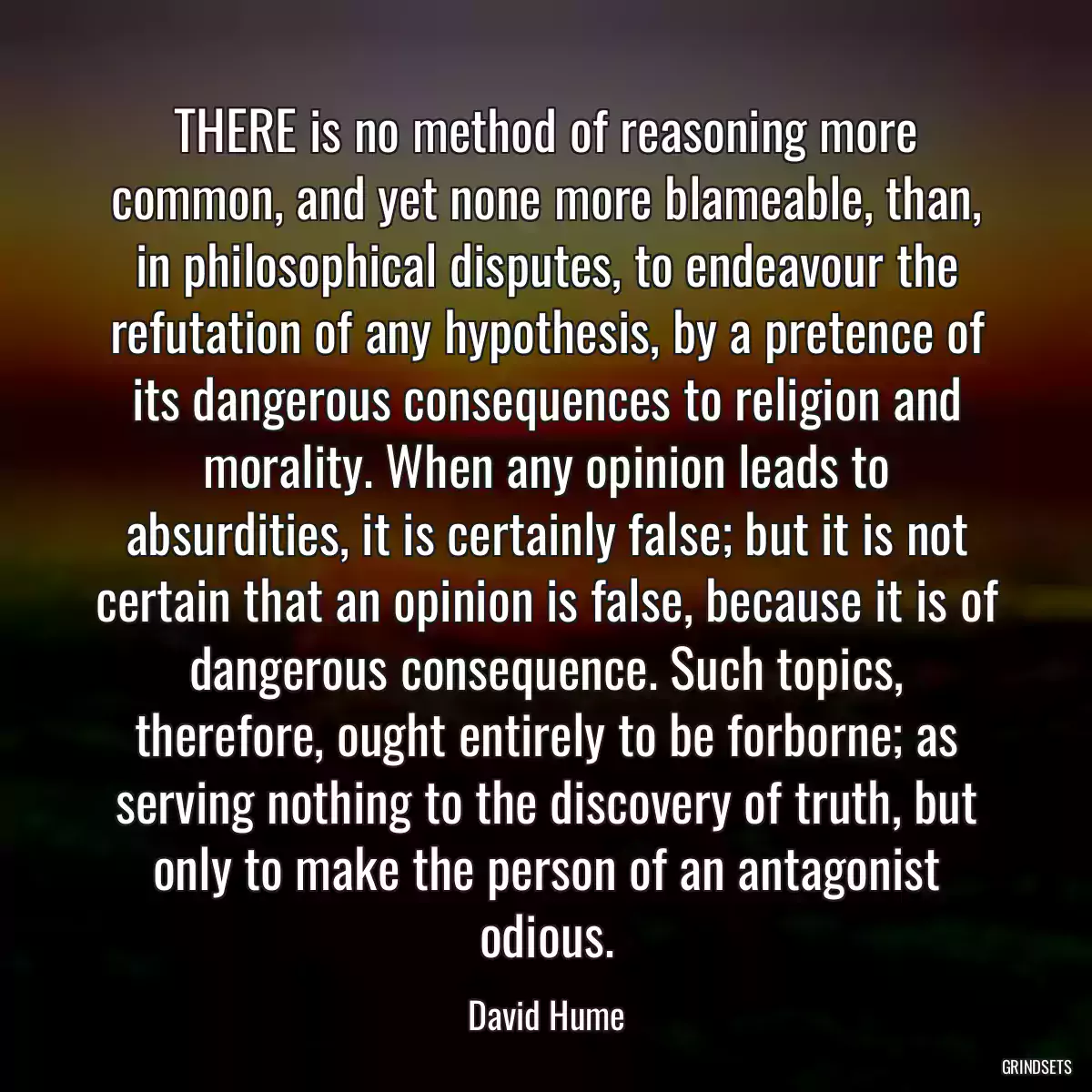
Quotes David Hume
Find dozens of David Hume with images to copy and share.

But there still prevails, even in nations well acquainted with commerce, a strong jealousy with regard to the balance of trade, and a fear, that all their gold and silver may be leaving them. This seems to me, almost in every case, a groundless apprehension; and I should as soon dread, that all our springs and rivers should be exhausted, as that money should abandon a kingdom where there are people and industry.
Let us consider what we call vicious luxury. No gratification, however sensual, can of itself be esteemed vicious. A gratification is only vicious when it engrosses all a man's expense, and leaves no ability for such acts of duty and generosity as are required by his situation and fortune. The same care and toil that raise a dish of peas at Christmas would give bread to a whole family during six months.
What is easy and obvious is never valued; and even what is in itself difficult, if we come to knowledge of it without difficulty, and without and stretch of thought or judgment, is but little regarded.
You may also like
I say then, that belief is nothing but a more vivid, lively, forcible, firm, steady conception of an object, than what the imagination alone is ever able to attain. This variety of terms, which may seem so unphilosophical, is intended only to express that act of the mind, which renders realities, or what is taken for such, more present to us than fictions, causes them to weigh more in the thought, and gives them a superior influence on the passions and imagination.
Accurate and just reasoning is the only catholic remedy, fitted for all persons and all dispositions; and is alone able to subvert that abstruse philosophy and metaphysical jargon, which, being mixed up with popular superstition, renders it in a manner impenetrable to careless reasoners, and gives it the air of science and wisdom.
An infinite number of real parts of time, passing in succession, and exhausted one after another, appears so evident a contradiction, that no man, one should think, whose judgement is not corrupted, instead of being improved, by the sciences, would ever be able to admit of it.
Belief is nothing but a more vivid, lively, forcible, firm, steady conception of an object, than what the imagination alone is ever able to attain.
Between married persons, the cement of friendship is by the laws supposed so strong as to abolish all division of possessions: andhas often, in reality, the force ascribed to it.

Avarice, the spur of industry, is so obstinate a passion, and works its way through so many real dangers and difficulties, that it is not likely to be scared by an imaginary danger, which is so small, that it scarcely admits of calculation. Commerce, therefore, in my opinion, is apt to decay in absolute governments, not because it is there less secure, but because it is less honourable.
If we take in our hand any volume; of divinity or school metaphysics, for instance; let us ask, Does it contain any abstract reasoning concerning quantity or number? No. Does it contain any experimental reasoning concerning matter of fact and existence? No. Commit it then to the flames: for it can contain nothing but sophistry and illusion.
Reason, in a strict sense, as meaning the judgment of truth and falsehood, can never, of itself, be any motive to the will, and can have no influence but so far as it touches some passion or affection. Abstract relations of ideas are the object of curiosity, not of volition. And matters of fact, where they are neither good nor evil, where they neither excite desire nor aversion, are totally indifferent, and whether known or unknown, whether mistaken or rightly apprehended, cannot be regarded as any motive to action.
It seems to me, that the only Objects of the abstract Sciences or of Demonstration is Quantity and Number, and that all Attempts to extend this more perfect Species of Knowledge beyond these Bounds are mere Sophistry and Illusion.
I never asserted such an absurd thing as that things arise without a cause.
The many instances of forged miracles, and prophecies, and supernatural events, which, in all ages, have either been detected by contrary evidence, or which detect themselves by their absurdity, prove sufficiently the strong propensity of mankind to the extraordinary and marvellous, and ought reasonably to begat a suspicion against all relations of this kind.
When men are most sure and arrogant they are commonly most mistaken, giving views to passion without that proper deliberation which alone can secure them from the grossest absurdities.
It is an absurdity to believe that the Deity has human passions, and one of the lowest of human passions, a restless appetite for applause
You may also like

THERE is no method of reasoning more common, and yet none more blameable, than, in philosophical disputes, to endeavour the refutation of any hypothesis, by a pretence of its dangerous consequences to religion and morality. When any opinion leads to absurdities, it is certainly false; but it is not certain that an opinion is false, because it is of dangerous consequence. Such topics, therefore, ought entirely to be forborne; as serving nothing to the discovery of truth, but only to make the person of an antagonist odious.
Nothing can be more unphilosophical than to be positive or dogmatical on any subject; and even if excessive scepticism could be maintained it would not be more destructive to all just reasoning and inquiry. When men are the most sure and arrogant, they are commonly the most mistaken, and have there given reins to passion, without that proper deliberation and suspense which can alone secure them from the grossest absurdities.